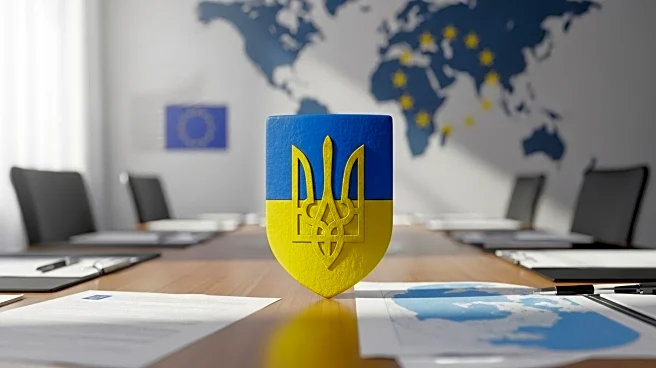What's Happening?
EU foreign and defense ministers convened in Copenhagen for informal talks aimed at brainstorming new strategies to support Ukraine amidst ongoing Russian aggression. The discussions included potential secondary sanctions targeting Russia's trading partners, with Lithuania's Defense Minister emphasizing the impact of U.S. sanctions. Denmark announced plans to host Ukrainian arms production on its soil, marking a significant move to bolster Ukraine's defense capabilities. Additionally, the EU debated the use of frozen Russian assets to aid Ukraine, with some countries advocating for their seizure despite legal concerns. The talks also considered shifting EU military training missions to Ukrainian soil, contingent on a ceasefire.
Why It's Important?
The EU's exploration of secondary sanctions and hosting Ukrainian arms production reflects a strategic shift in its support for Ukraine, potentially increasing pressure on Russia and strengthening Ukraine's defense. The debate over frozen Russian assets highlights the EU's commitment to financially supporting Ukraine, though legal and economic implications remain contentious. These measures could enhance Europe's geopolitical influence and demonstrate solidarity with Ukraine, impacting future EU-Russia relations and global trade dynamics. The potential relocation of military training missions to Ukraine signifies a readiness to deepen military cooperation, contingent on conflict resolution.
What's Next?
The EU may proceed with implementing secondary sanctions and establishing Ukrainian arms production sites, contingent on diplomatic negotiations and legal assessments. The debate over frozen Russian assets will continue, with potential shifts in investment strategies to maximize support for Ukraine. The relocation of military training missions to Ukraine remains conditional on a ceasefire, requiring consensus among EU member states. Future EU actions will depend on ongoing diplomatic efforts and the evolving geopolitical landscape, with potential implications for EU-Russia relations and global trade partnerships.
Beyond the Headlines
The EU's strategic decisions could influence broader geopolitical dynamics, including its role in global security and trade. The legal and ethical considerations surrounding the seizure of Russian assets may set precedents for international financial policies. The establishment of Ukrainian arms production in the EU could signal a shift in defense industry collaborations, impacting regional security frameworks. These developments may also affect public perceptions of the EU's commitment to supporting Ukraine and its stance on international conflict resolution.











